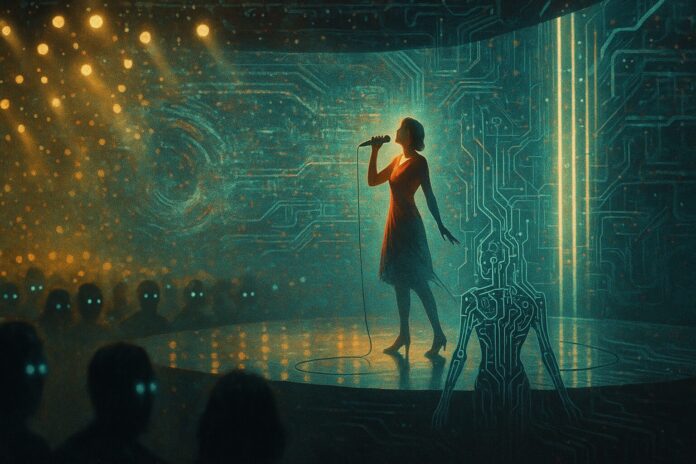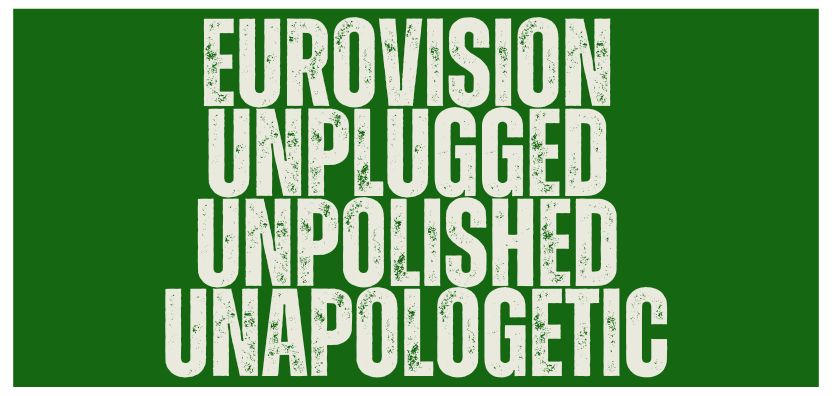
|
Getting your Trinity Audio player ready...
|
From a fake “AI band” in Moldova’s 2025 selection to San Marino’s sanctioned AI entries, and global viral hits like Japan’s YAJU&U, artificial intelligence is already reshaping music. Eurovision’s organisers have no clear rules to handle this. Will the contest’s human spirit survive?
The Moldova hoax
In January 2025, Moldova’s national selection erupted into scandal when Eblansh Band quietly withdrew, officially citing a band member’s illness.
Investigation revealed that Ukrainian pranksters had submitted an AI-generated song titled “O, Moldova mea dragă!” (Oh, my dear Moldova!) to test the Moldovan jury’s ability to detect artificial content. The stunt exposed a critical vulnerability in the selection process-not only did the fictional band’s entry pass initial screening, but it was officially accepted into the competition lineup before its withdrawal.
Moldova’s Head of Delegation Daniela Crudu admitted that entries “were not analysed on whether they were made with artificial intelligence. That is for the jury to do at the live auditions”. This hands-off approach underscored the lack of clear protocols for addressing AI-generated content in national selections.
It contributed to broader issues in Moldova’s selection process, leading to the country’s withdrawal from Eurovision 2025. At a press conference, Moldova 1’s Director Corneliu Durnescu blamed “economic, administrative, and artistic challenges”.
San Marino goes AI
San Marino took a more deliberate approach by openly incorporating AI-generated music into their national selection process. For their Una Voce per San Marino competition, the tiny nation partnered with Casperaki, a tech company specialising in AI music production.
Four songs developed through Casperaki’s AI tools competed for a place in San Marino’s national final.
For many, it raised eyebrows. The fact that half the finalists in a Eurovision preselection were composed by an algorithm was unprecedented. If one microstate can experiment publicly with AI in 2024, what about the rest of Europe?
EBU’s AI dilemma
Behind both stories lies a glaring gap: the European Broadcasting Union (EBU) has no specific Eurovision rulebook clause on AI-written entries.
In 2023 EBU deputies publicly pondered an AI ban, warning that contest creativity “should come from humans and not from machines”. EBU deputy director Jean-Philip de Tender even mused what would happen if AI-generated songs appeared, noting that excessive AI use “dilutes the genuine, spontaneous emotions” of Eurovision.
But no firm ban or guidance was issued for 2024 or 2025.
When an AI song tops the charts
Beyond Eurovision, AI-generated music has already broken into the mainstream charts. In Japan, a song titled “YAJU&U” became one of 2025’s biggest domestic hits despite being openly AI-generated. The track climbed to the number-one spot on Spotify Japan’s Viral 50 playlist.
No secret was made about AI involvement. It’s success suggests audiences may accept AI-generated music when it’s presented transparently as part of digital culture rather than attempting to pass as conventionally human-created art.
Authenticity vs. innovation
The rise of AI has split the music community. Veteran songwriters and pop stars have loudly sparred over what AI means for authenticity. A group of artists – including Billie Eilish and Katy Perry – even signed an open letter warning tech firms not to “sabotage creativity.” Legendary songwriter Nick Cave denounced ChatGPT-penned lyrics as “a grotesque mockery of what it is to be human”.
In their view, algorithmic writing threatens to hollow out artistic emotion. Yet other musicians embrace AI as the inevitable future.
Singer Daniel Bedingfield (famous for “Gotta Get Thru This”) argues that artists “have to adapt or die” in an AI era. He told The Guardian that “AI is now here for ever,” and that those who resist it will be “left behind”.
This clash highlights a core question: is it better to create songs by committee or give partial creative credit to an algorithm?
Boot camp generation
Eurovision already relies on professional songwriting camps where a many writers can collaborate on a single entry. If a pop song with up to ten human co-writers can still feel genuine to fans, is an AI-assisted tune truly less “authentic” than a track from a cookie-cutter pop factory?
If Eurovision fans have accepted radio-friendly formula pop from committees, why should AI be any more suspect?
Of course, the difference is that an AI isn’t human – it has no story or soul.
This is where the ethical concerns arise. Who “owns” an AI-written song? Does the composer of the algorithm get royalties, or the user who prompted it? And more philosophically: what happens to the emotional core of a ballad if no human heart beat behind it?
Eurovision thrives on moments of genuine feeling. If those messages are spat out by a neural network, do they still resonate?
Music’s soul at risk
The fear is that overuse of AI could commodify songwriting. Instead of artists mining personal experiences, machine-generated formulas might push homogenised pop. Lyrics become mash-ups of data patterns rather than true sentiments.
This risks stripping away the spontaneity and quirkiness that gave Eurovision gems like “Fairytale” or “Madness of Love” their magic.
The EBU needs to consider clarifying the contest rules, perhaps requiring declarations of AI use in submitted songs, or setting limits on machine-generated content. Simply sweeping AI under the carpet may no loner be longer an option.
Above all, this needs a public conversation. Broadcasters, songwriters and fans should debate what Eurovision represents. Do we want a contest where machines can buy the spotlight, or one where human stories and imperfections still shine?
After all, Eurovision’s motto is “Unite by Music,” not “Unite by Machine.”






